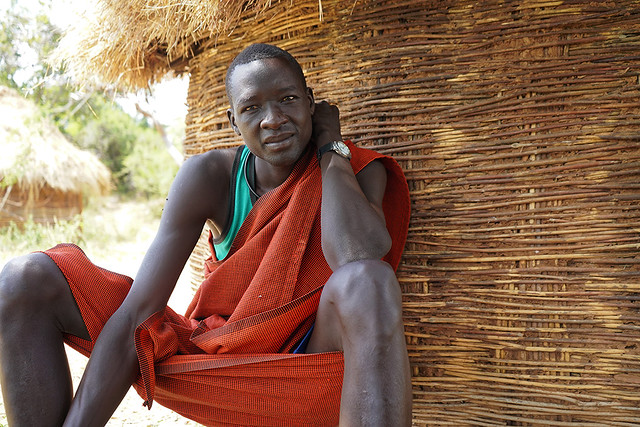In the Greater Karamoja Cluster, new pathways to peace

Loyaa Village sits on a sandy plain at the edge of rain-starved Turkana County, in northeastern Kenya—part of the Greater Karamoja Cluster, which also includes the borders of Uganda, South Sudan, and Ethiopia. It is the last village before the neighboring Kenyan West Pokot County, and was once a frequent target for cattle raids.
For Esekon Epyo, now a 45-year-old grandmother, one attack on Loya Village remains particularly vidid. Back in 1998, a group of Pokot cattle rustlers, creeping unseen through the bush, charged the small community just before dusk. “Bullets, bullets everywhere,” Epyo recalls. Her husband was slain in the ambush.
Reprisals followed, and fear kept communities on both sides of the border in a years-long chokehold.
Slowly, community leaders throughout the Greater Karamoja Cluster paved the way for peace dialogues. A set of FAO-facilitated interventions, carried out over the course of a decade, built upon these community-level initiatives in partnership with the Intergovernmental Authority on Development (IGAD), culminating in the signing of a multilateral Memorandum of Understanding on cross-border animal health between Kenyan, Ugandan, Ethiopian, and South Sudanese national governments.
This past year, the ensuing good practice, “Cross-border coordination of livestock movements and sharing of natural resources among pastoralist communities in the Greater Karamoja Cluster,” was selected as one of 25 winning development projects at the Expo 2020 Dubai Global Best Practice Programme, to be exhibited during a three-week run sometime between October 2020 and April 2021. The set of interventions highlights the humanitarian-development-peace nexus in action, and shows how community-level initiatives can have wide-ranging regional effects.
For decades, the Greater Karamoja Cluster’s deadly matrix of cattle raids and revenge attacks hampered the region’s economic and social well-being.
Historically, communities living in the Greater Karamoja Cluster coordinated information about animal disease outbreak, pasture grazing routes and water sources. Dry, drought-prone Turkana depended on other districts to access grazing grounds, and movement across boundaries became a requisite for survival. These symbiotic relations between neighboring groups helped pastoralists eke out livings across the frequently harsh terrain, which alternates from semi-arid desert to thickly forested hills.
However, the constant outbreak of violence not only severed these traditional knowledge networks, it also curtailed the frequent and unfettered movement upon which pastoralist lives and livelihoods depend. This also had unfortunate repercussions for animal health. As the ever-present threat of raids kept herds and their flocks corralled into divided territories, livestock disease spread from overcrowded conditions.
In helping to create new pathways of communication and interaction between neighboring groups, the decade-long, FAO-supported interventions revitalized traditional networks of knowledge and resource sharing.
In the tiny village of Lomudita, sprawled in a dense grove of forest in West Pokot, these peace and community-building efforts continue to have deep reverberations. Twenty-six-year-old Katon Lobotim once seized livestock in groups of five to ten men, targeting villages as far as Moroto, across the border in Uganda. They would wrangle handfuls of cows at a time, and twice as many goats; the animals represented status and wealth, and financed hefty bride prices.
Now, cross-border markets have virtually supplanted cross-border raids. Pastoralists exchange livestock through official channels, and in many parts of the Greater Karamoja Cluster, the climate of fear has all but dissipated.
“We have learned that we were so foolish a long time ago,” says Lobotim, now a married father of two. “If you go and take your cows and get money, you can do anything you want through business,” he adds, “without raiding or fear of death.”
This article is made possible by the support provided by the European Union, under the Partnership Programme contributing to the Global Network Against Food Crises. The contents of this article are the sole responsibility of the Food and Agriculture Organization of the United Nations and do not necessarily reflect the views of the European Union.
Related links
- Cross-border coordination of livestock movements and sharing of natural resources among pastoralist communities in the Greater Karamoja Cluster
- Mobile futures: sustaining peace, restoring movement in the Greater Karamoja Cluster (photo album)
- Local perspectives on peace: community testimonials in the Greater Karamoja Cluster (photo album)
- Expo 2020 Dubai Global Best Practice Programme
- Intergovernmental Authority on Development (IGAD)
- Warriors on the path to peace (podcast)



